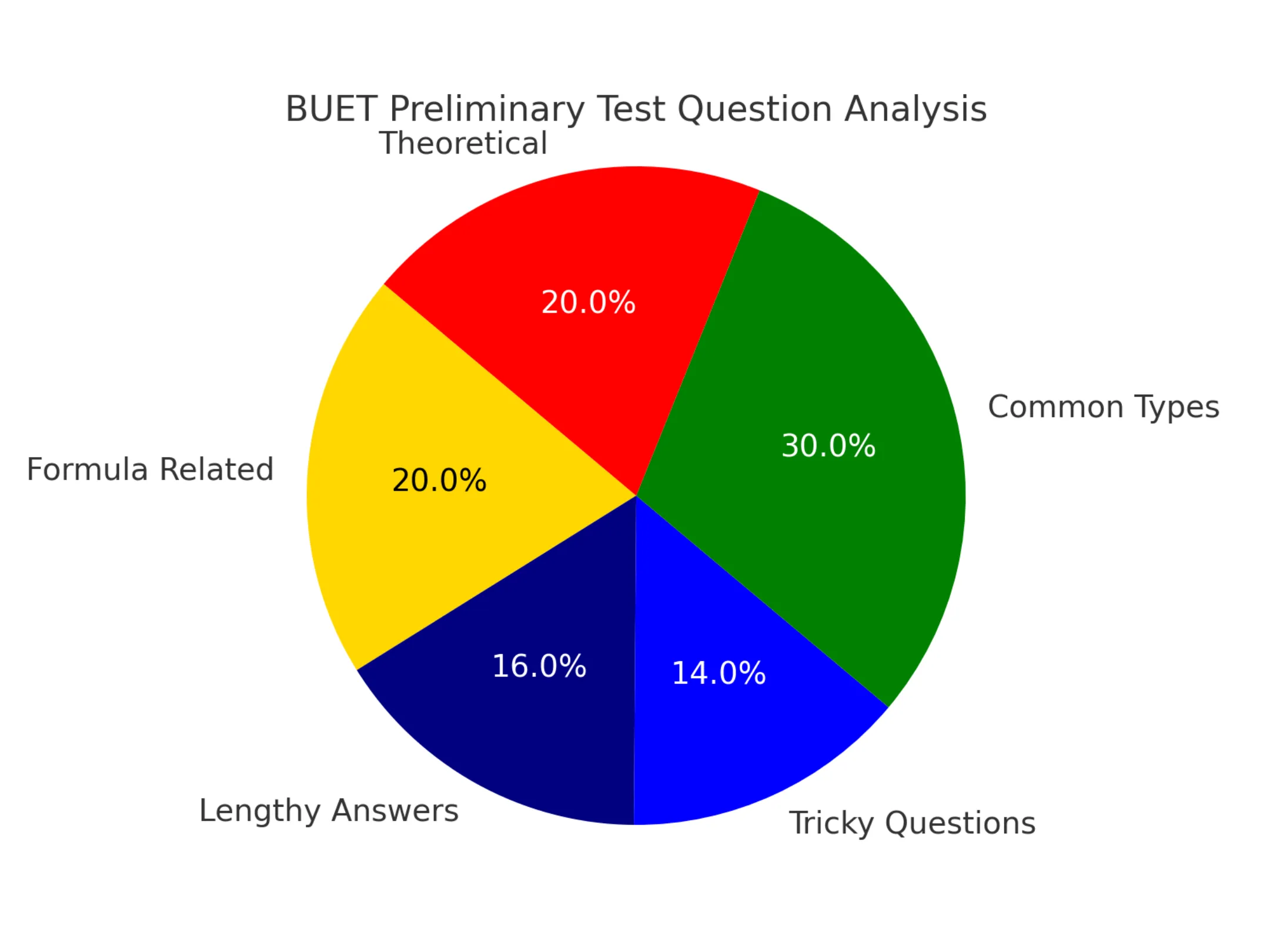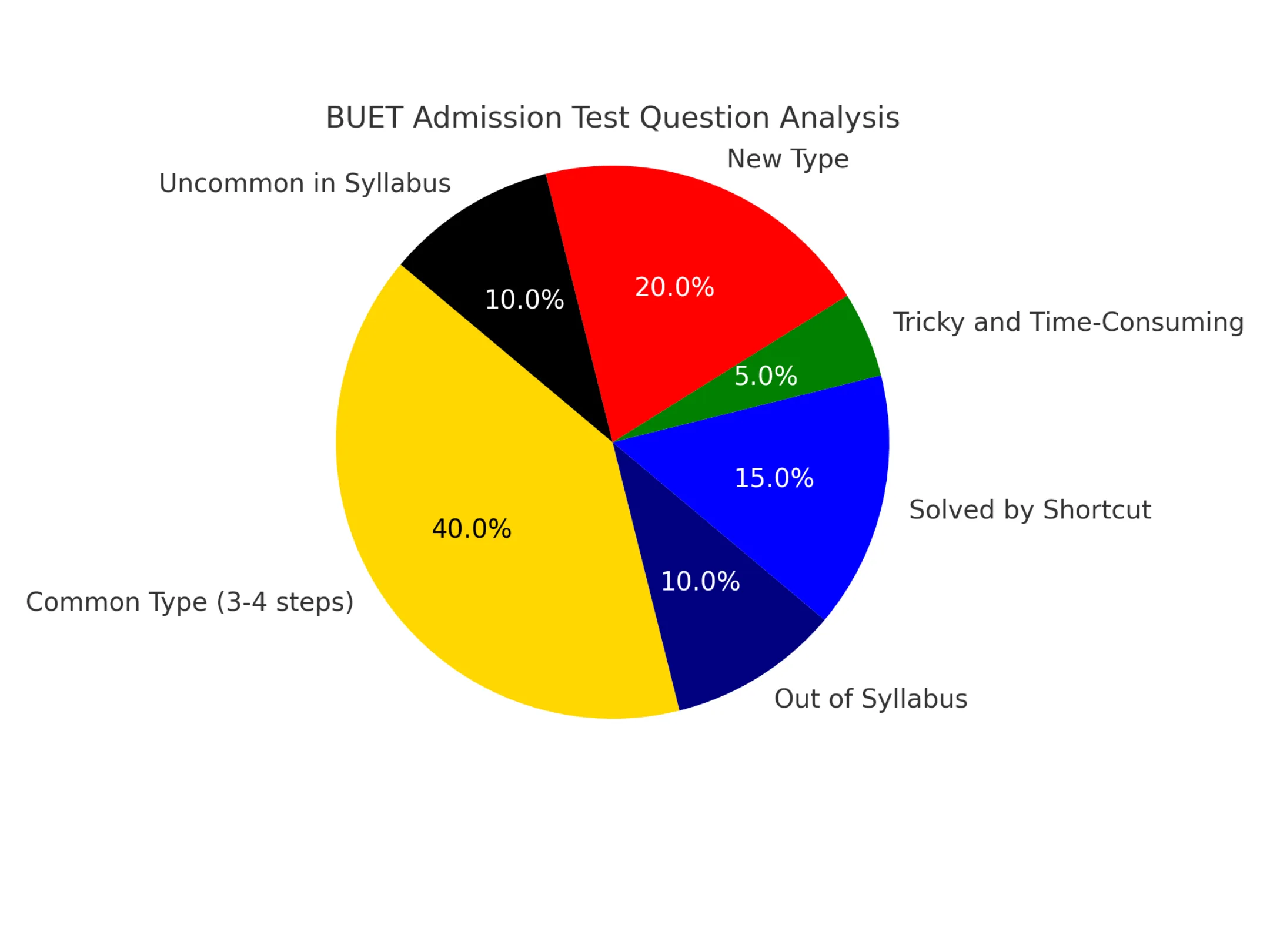BUET Question Bank
The BUET Question Bank is an essential resource for aspiring students aiming to succeed in the BUET admission test. Unlike other universities, BUET does not repeat previous questions but frequently recycles question types, making practice crucial for understanding these patterns.
Check the official website for latest admission informations
Since the 2021-2022 session, BUET has introduced a preliminary (preli) MCQ exam followed by a written exam. The preliminary exam, worth 100 marks, selects the top 6,000 students for the 400-mark written exam. Both exams cover Physics, Chemistry, and Mathematics, providing a comprehensive assessment of candidates’ knowledge and skills.
BUET admission test Questionbank
BUET Preliminary MCQ Analysis

- Exam Duration and Difficulty:
- The preliminary exam is only 1 hour, but the questions are tricky and lengthy, especially in Mathematics. It’s challenging to solve all questions within the time limit, so stay calm and focus on answering the easier questions first to maximize your score.
- Chemistry:
- Chemistry questions are comparatively easier and can be completed in about 15 minutes. Start with Chemistry to gain extra time for the more challenging Physics and Math sections.
- Physics:
- Our analysis shows that about 65% of Physics questions are direct formula-based one-step problems.
- Around 5% are very tricky and lengthy, making them harder to solve.
- 10% are theoretical questions.
- The remaining 20% are two-step or lengthy problems, some of which can be tackled using shortcuts. Prioritize the direct and theoretical questions before attempting the lengthy ones.
- Mathematics:
- In Mathematics, there is a significant emphasis on calculus, especially differentiation. About 5% of questions are direct formula-based.
- Questions from topics like conics, straight lines, and circles tend to be lengthy but easier. Be mindful of this and manage your time accordingly.
- Chapter Focus:
- BUET tends to focus on specific chapters each year, making questions from those chapters particularly tricky. Ensure thorough preparation in all chapters to avoid panic during the exam.
- Question Anomalies:
- Occasionally, BUET includes questions with no correct answers or options. These are likely designed to test your mental resilience. If you encounter such questions, don’t panic. Skip them to maintain your composure and focus on solvable questions.
- Use this analysis to strategize your preparation and approach the BUET exam with confidence. Good luck!
BUET Written Exam Analysis

Exam Structure: You have 40 questions to answer in 2 hours, giving you approximately 3 minutes per question. Time management is crucial, so practice pacing yourself effectively throughout the exam.
Question Value: Each question is worth 10 marks. While BUET doesn’t officially mention partial marking, students suggest that partial marks may be awarded for showing relevant formulas or steps, even if the problem isn’t fully solved.
Chemistry: In the written exam, Chemistry questions require detailed theoretical explanations and may involve drawing diagrams. Organic chemistry, particularly reactions and productions of hydrocarbons, is crucial. Practice these thoroughly to ensure comprehensive understanding and preparation.
Physics: Physics questions are conceptually deep and may require 2 to 4 steps to solve. Some questions may involve calculus and concepts beyond the short syllabus. Having a well-practiced calculator can be advantageous. BUET allows two calculators in the exam hall.
Mathematics: Math questions include both lengthy and tricky scenarios often based on real-life applications. Focus on examples from academic higher math books during your preparation to strengthen your problem-solving skills and familiarity with diverse question types.
Question Types: Approximately 40% of questions are common and relatively straightforward. However, aiming for a high score (around 65-70%) is necessary due to intense competition. Stay calm under pressure and ensure your preparation and strategy are thorough and effective to maximize your performance on the exam day.
We recommend that students take notes of challenging questions during their preparation. Writing them out by hand and solving them repeatedly not only enhances understanding but also boosts confidence in tackling similar questions during the exam. This methodical approach not only sharpens problem-solving skills but also reduces anxiety in the exam hall. By practicing diligently and focusing on mastering key concepts, students can approach the BUET admission test with greater confidence and readiness.
You can read our comprehensive experts guidelines about BUET admission test preparation